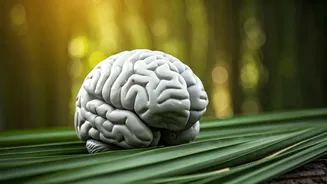What is Tai Chi?
Tai Chi, often called Tai Chi Chuan, is a traditional Chinese practice combining meditation and movement. Its gentle, flowing exercises focus on coordination,
balance, and deep breathing. While it appears simple, Tai Chi requires considerable mental concentration and body awareness. Each movement is performed slowly and deliberately, promoting relaxation and mindfulness. Many people practice Tai Chi for its physical benefits, such as improved flexibility and strength, but it's increasingly recognized for its positive effects on mental health and cognitive function. The practice helps to reduce stress, improve mood, and enhance overall well-being. Tai Chi also involves a specific philosophy emphasizing the balance of yin and yang, encouraging harmony between the body and mind. Regular practice of Tai Chi can provide a comprehensive approach to health, encompassing both physical and mental aspects.
Brain's Transformation: 8 Weeks
Research indicates that regular Tai Chi practice can bring significant changes to your brain in just eight weeks. The practice improves cognitive function by increasing blood flow to the brain, which enhances the delivery of oxygen and nutrients. This can lead to better memory, improved focus, and a general improvement in mental clarity. Studies have also revealed that Tai Chi can increase the size of the hippocampus, the brain region responsible for memory and learning. Moreover, Tai Chi's meditative aspects help reduce stress and anxiety, which can negatively impact cognitive performance. By lowering stress levels, Tai Chi creates an environment in which the brain functions more efficiently. The combination of physical movement, mental focus, and deep breathing fosters a unique practice that benefits both the body and mind, resulting in enhanced brain function within a relatively short period.
Cognitive Impact Explained
Tai Chi's positive impact on the brain stems from several mechanisms. The coordinated movements require a high degree of mental focus, thereby strengthening neural pathways. The practice promotes neuroplasticity, the brain's ability to reorganize itself by forming new neural connections. This enhances learning and memory. Tai Chi also affects the production of neurotransmitters like dopamine and serotonin, which play crucial roles in mood regulation and cognitive performance. By improving blood flow to the brain, Tai Chi ensures that the brain receives adequate oxygen and nutrients, which are essential for optimal cognitive function. The meditative aspect of Tai Chi helps reduce stress hormones like cortisol, further supporting improved mental clarity. This combination of physical activity, mental focus, and stress reduction leads to a holistic approach to brain health, making Tai Chi a beneficial practice for people of all ages.
Why Does Tai Chi Work?
Tai Chi’s effectiveness is rooted in its unique combination of physical and mental elements. The slow, deliberate movements stimulate multiple brain regions, improving coordination and balance. The need for precise movements and maintaining posture cultivates a strong sense of body awareness and mental focus. Additionally, deep breathing exercises promote relaxation, reducing stress and anxiety. The practice helps in the release of endorphins, which have mood-boosting effects, further enhancing cognitive function. Tai Chi also helps improve balance and coordination, which are crucial for maintaining cognitive health as we age. Moreover, the meditative aspect encourages mindfulness, which has been shown to improve attention and memory. This comprehensive approach ensures that Tai Chi works on multiple levels, benefiting both physical and mental health. The combination of gentle exercise, mental concentration, and relaxation makes Tai Chi a powerful tool for enhancing brain health.

















